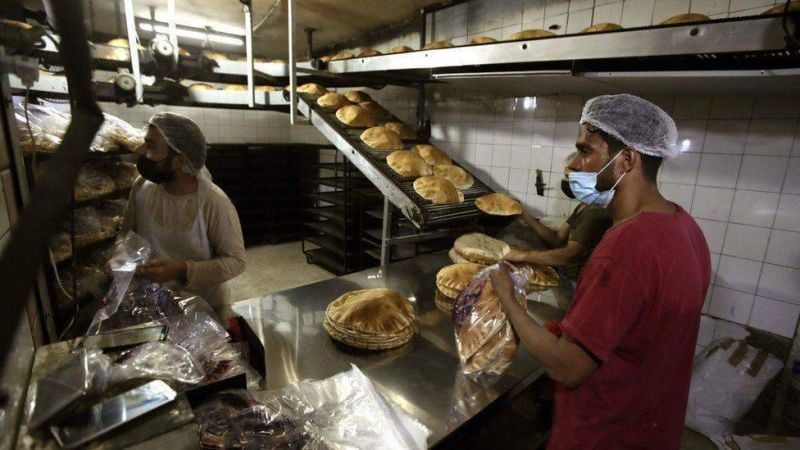
Workers preparing bread at a bakery in Lebanon. (Credit: File Photo/AFP)
BEIRUT — In a report released this week on food security challenges in the MENA region related to the Russia-Ukraine War, Mercy Corps, a global humanitarian aid organization, expressed its concerns over Lebanon's food insecurity.
Russia's ongoing invasion of Ukraine affected the food security of many countries in the MENA region, many of which import the majority of their wheat from the two countries.
"At the outset of the war in Ukraine, Lebanon had the greatest dependence on Ukrainian wheat globally," the report read. In 2022, 77 percent of Lebanon's total wheat imports were imported from Ukraine through the Black Sea. Wheat imports from the Ukraine continued throughout 2023.
Developments since the beginning of the war
From February to July 2022, "grain shipments from Ukraine [to the world] were at risk of being completely halted," stated the report.
In July 2022, the Black Sea Grain Initiative (BSGI) was reached between Russia and Ukraine. Mediated by Turkey and the United Nations, the BSGI prevented a potential global wheat crisis. The agreement "enabled Ukraine to export over half of its agricultural exports through the Black Sea ports, which played an essential role in stabilizing wheat markets and lowering global food prices."
In July 2023 however, Russia refused to renew the BSGI. According to the report, "Russia's exit from the BSGI and subsequent escalations in the war in Ukraine during the summer of 2023 risk potentially severe essential commodity price and supply shocks in the coming months."
Meanwhile, the "current stability in wheat and other critical commodity prices is a positive indication that markets have not chosen to respond poorly to recent escalations." Still, these events indicate that "conflict escalations in the Black Sea could further impact both Ukrainian and Russian food and other commodity exports."
Impact on Lebanon
The report states that "a major escalation affecting Black Sea exports from both Russia and Ukraine would likely disrupt supply for Lebanon in the short run."
According to the report, Lebanon has a "high vulnerability to external supply shocks due to limited domestic production, lack of ability to easily access additional markets, and/or strategic reserve capacity." Lebanon domestically produces only 20 percent of its local cereal consumption needs.
Lebanon also has a "moderate to high vulnerability to sustained price shocks stemming from a Black Sea escalation."
For now, the country continues to benefit from the $150 million World Bank wheat loan, which is expected to last for the next six to nine months at best. According to Mercy Corps, the loan "will insulate Lebanon from short-term hikes," but "sustained high commodity prices would shorten the lifespan of the loan, and subsequently erode Lebanon’s ability to continue bread subsidy regimes, with negative consequences for residents’ food security." Concerns over price spikes once the loan runs dry are high.
L'Orient Today contacted the minister of Economy but he was not immediately available for response.
Lebanon's dependence on Ukrainian wheat means its "current supply routes could easily be disrupted by further escalations, especially if shipping routes from Danube terminals are constrained."
The report also mentioned the possibility of increased tensions between Lebanese citizens and Syrian refugees due to a potential wheat crisis. "Bread prices and/or shortages have the potential to drive conflict and exacerbate tensions between the Lebanese and Syrian refugee populations, as was experienced in 2022."
According to official estimates, Lebanon is host to some two million Syrian refugees, 830,000 of which are registered with the UN.
When the wheat loan dries out, "a combination of more expensive supply routes and upward pressures on wheat markets could result in inaccessibly high bread prices for vulnerable Lebanese households," Mercy Corps noted.
Lebanon has been submerged in an economic crisis since 2019, which the World Bank ranked among the world's top three in terms of severity since the 19th century. The crisis left over three-quarters of the population in poverty.